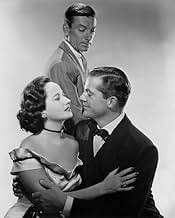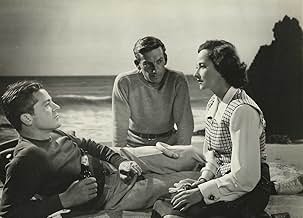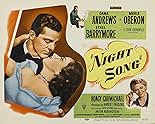IMDb RATING
6.4/10
717
YOUR RATING
When a beautiful socialite falls in love with an embittered composer who is blind, she feigns blindness herself in order to get closer to him.When a beautiful socialite falls in love with an embittered composer who is blind, she feigns blindness herself in order to get closer to him.When a beautiful socialite falls in love with an embittered composer who is blind, she feigns blindness herself in order to get closer to him.
- Awards
- 4 wins total
Whit Bissell
- Party Guest
- (uncredited)
Leonard Bremen
- Chez Mamie Headwaiter
- (uncredited)
Charles Cirillo
- Sailor at Chez Mamie
- (uncredited)
Angela Clarke
- Woman
- (uncredited)
George Cooper
- Bellboy
- (uncredited)
Lynn Craft
- Party Guest
- (uncredited)
Suzi Crandall
- Fur-Coated Pedestrian
- (uncredited)
Herbert Evans
- Butler
- (uncredited)
Featured reviews
If you ask me, this film seems undervalued or under-appreciated. I don't know why. RKO's NIGHT SONG stars Dana Andrews as a blind pianist and Merle Oberon as the woman who loves him. The music is wonderful, and while the plot is full of melodramatic complications and a liberal amount of hokum, it still manages to entertain and engage the audience because the characters are well-drawn and well played. The film boasts the added bonus of having Ethel Barrymore and Hoagy Carmichael in the supporting roles.
In some ways, NIGHT SONG reminds me of MAGNIFICENT OBSESSION, where Irene Dunne (or Jane Wyman, take your pick) experiences blindness and manages to find love in an unlikely source.
While not considered an 'essential' (in the TCM sense of the word), NIGHT SONG is a studio film that is very well put together and succeeds on many levels.
In some ways, NIGHT SONG reminds me of MAGNIFICENT OBSESSION, where Irene Dunne (or Jane Wyman, take your pick) experiences blindness and manages to find love in an unlikely source.
While not considered an 'essential' (in the TCM sense of the word), NIGHT SONG is a studio film that is very well put together and succeeds on many levels.
Bearing more than a distant resemblance with "magnificent obsession" ,Stahl's tear jerker of the thirties (remade by Douglas Sirk in the fifties )"Night Song " is less melodramatic ,but ,mainly in its second part ,drags on a little bit;the movie features two real life musicians :Arthur Rubinstein in the flesh ,and Hoagy Carmichael whose songs were covered even by Beatle George Harrison ("Baltimore Oriole"," Hong Hong Blues) and his influence shows in McCartney's song "baby's request" .
Dana Andrews is reliable as ever ,and Madame Barrymore provides good support (dig the line when she tells her niece that all she wants is peace);Merle Oberon's playing is a bit emotionally remote ;the music is omnipresent ,classical stuff or Carmichael's "monkey song" .But the story itself is a bit derivative.
Dana Andrews is reliable as ever ,and Madame Barrymore provides good support (dig the line when she tells her niece that all she wants is peace);Merle Oberon's playing is a bit emotionally remote ;the music is omnipresent ,classical stuff or Carmichael's "monkey song" .But the story itself is a bit derivative.
I intended to watch this 1947 romantic drama to see the talented and most beautiful Jacqueline White in a starring role, but I had to settle seeing Ms. White in a short cameo appearance. The three (3) main stars were Dana Andrews, Hoagy Carmichael, and Merle Oberon and although I wanted to see more of Jacqueline White I was not disappointed with the on screen presence of the aforementioned three stars.
Dan Andrews plays Dan, a blind lyricist and talented pianist who lost his eyesight later on in life, so he does remember how beautiful the world and women were when he had his vision. His best friend is the actor Hoagy Carmichael who plays Chick, a fella who can set his blind buddy straight when he gets into one of his stubborn moods, which seems to occur more often than not.
Dan does not feel sorry for himself since losing his eyesight. Quite to the contrary he despises people who look down upon his blindness as a handicap which is why Dan and Chick are best friends. Into the picture comes a wealthy and beautiful Cathy played by Merle Oberon, who realizes with the assistance of Dan's best friend Chick that having any level of pity on Dan is like putting grease onto a hot fire, so Cathy decides to pretend to be blind so that they appear to have something in common.
I won't spoil the ending for anyone but suffice to say that although sometimes love is blind as they say, love can also conquer peoples fear of the unknown and in this case, love is like a Night Song which makes this film a pleasure to see.
I give the film a satisfying 7 out of 10 IMDb rating having watched the film twice, even if I only got a glimpse of the beautiful Jacqueline White. Well worth seeing, no pun intended.
Dan Andrews plays Dan, a blind lyricist and talented pianist who lost his eyesight later on in life, so he does remember how beautiful the world and women were when he had his vision. His best friend is the actor Hoagy Carmichael who plays Chick, a fella who can set his blind buddy straight when he gets into one of his stubborn moods, which seems to occur more often than not.
Dan does not feel sorry for himself since losing his eyesight. Quite to the contrary he despises people who look down upon his blindness as a handicap which is why Dan and Chick are best friends. Into the picture comes a wealthy and beautiful Cathy played by Merle Oberon, who realizes with the assistance of Dan's best friend Chick that having any level of pity on Dan is like putting grease onto a hot fire, so Cathy decides to pretend to be blind so that they appear to have something in common.
I won't spoil the ending for anyone but suffice to say that although sometimes love is blind as they say, love can also conquer peoples fear of the unknown and in this case, love is like a Night Song which makes this film a pleasure to see.
I give the film a satisfying 7 out of 10 IMDb rating having watched the film twice, even if I only got a glimpse of the beautiful Jacqueline White. Well worth seeing, no pun intended.
The job of a movie is to give the audience members a bigger slice of life than they would normally experience. Night Song, a classic movie of the post-war 1940's, gives that slice of life with rare grace, elegance and style. Critics have panned it because of the "bad" far-fetched plot, the "bad" music, and "bad" acting.
I like this movie because, quite coincidentally, I personally have digested many of the slices of life in the "far-fetched" plot. The movie is about a piano player/composer who is struck on the head in the prime of his life. I am a piano player/composer who was struck on the head in the prime of my life. We both made it through a war era untouched, he WWII, and I Vietnam, well almost. He is living hand to mouth with his best friend. I am also living hand to mouth with my best friend, my wife. For those who love far-fetched coincidences: The composer's last name is Evans—my grandfather's name before he changed it. The movie was probably shot in 1946, the year I was born. Exactly 20 years later I saw Artur Rubenstein, who acted and performed in this movie, in a concert at the Music Center in Los Angeles--the only time I ever went to such a concert. It opened in Sweden on my birthday. What could be more far-fetched?. The not so far-fetched plot twists were not lost on me. As I watched, I was saying to myself, "What is possible for me? Miracles happen every day! Every success story was improbable before it happened!" After watching the film, I went over to the piano and played my own unfinished concerto once again!
As for the Leith Stevens music, if you didn't like it, say so. If it didn't touch you, say so. I liked it, immensely. It touched me immensely! If you want a thrill, type in Leith Stevens on IMDb. You'll find page after page of musical credits—right up to 2005! The man is a modern master composer played by the greatest performers of that time in this movie! Not bad for "bad" music! The job of film critics is to say what they like and dislike about films and why. They should leave all categorical good and bad thoughts completely out of the conversation.
One measure of the talent of an actor, and some say the only measure of a film, is the ability to transport the mind and the spirit of the viewer to another time and place. I was completely transported by this movie. I was perfectly comfortable with ALL the performances, by some of the most distinguished actors of the era, because I was ready, willing and able to be transfixed; and this film is transfixing! Let's get it on DVD!
I like this movie because, quite coincidentally, I personally have digested many of the slices of life in the "far-fetched" plot. The movie is about a piano player/composer who is struck on the head in the prime of his life. I am a piano player/composer who was struck on the head in the prime of my life. We both made it through a war era untouched, he WWII, and I Vietnam, well almost. He is living hand to mouth with his best friend. I am also living hand to mouth with my best friend, my wife. For those who love far-fetched coincidences: The composer's last name is Evans—my grandfather's name before he changed it. The movie was probably shot in 1946, the year I was born. Exactly 20 years later I saw Artur Rubenstein, who acted and performed in this movie, in a concert at the Music Center in Los Angeles--the only time I ever went to such a concert. It opened in Sweden on my birthday. What could be more far-fetched?. The not so far-fetched plot twists were not lost on me. As I watched, I was saying to myself, "What is possible for me? Miracles happen every day! Every success story was improbable before it happened!" After watching the film, I went over to the piano and played my own unfinished concerto once again!
As for the Leith Stevens music, if you didn't like it, say so. If it didn't touch you, say so. I liked it, immensely. It touched me immensely! If you want a thrill, type in Leith Stevens on IMDb. You'll find page after page of musical credits—right up to 2005! The man is a modern master composer played by the greatest performers of that time in this movie! Not bad for "bad" music! The job of film critics is to say what they like and dislike about films and why. They should leave all categorical good and bad thoughts completely out of the conversation.
One measure of the talent of an actor, and some say the only measure of a film, is the ability to transport the mind and the spirit of the viewer to another time and place. I was completely transported by this movie. I was perfectly comfortable with ALL the performances, by some of the most distinguished actors of the era, because I was ready, willing and able to be transfixed; and this film is transfixing! Let's get it on DVD!
They used to show it on Turner Classic Movies on Ethel Barrymore's birthday (when they would show all of her movies). It contains a wonderful original mini-concerto by film composer, Leith Stevens, written just for this film. I think this movie is wonderful, in part, because it really exemplifies the best sort of films that glamorize classical music and not only give the film-goer a glimpse into the life and excitement of being a musician, but a peak into the collaborative creative process, itself. Many of these films were made in the '30s, '40s and '50s. They are rarely made now; usually films about musicians, especially about classical musicians, alienate the audience from the artists rather than inspiring empathy and a desire to emulate the stars on screen. Also, such clever and moving plots in love stories are fairly rare now. Ironically, it has wonderful scenes where Hoagy Carmichael takes dictation for the blind composer but in real life, Hoagy Carmichael, one of the great jazz musicians of the 20th Century, could not read music. I wonder if the plot was inspired at all by the fate of the '20s Jazz Great, Bix Beiderbeck, who drank himself to death at a young age because he found it increasingly hard to get work in the Paul Whiteman-inspired era of big bands who played from written parts. It also has some wonderful quotable one-liners and great, even profound dialogue, I wish it were available. That a film with such a star-studded line-up should be completely out of print is astounding: Dana Andrews, Merle Oberon, Hoagy Carmichael, Ethel Barrymore, the great pianist, Arthur Rubenstein (who even has a couple of lines), the great Conductor, Eugene Ormandy, and the New York Philharmonic, as it was at its peak at the end of the '40s. There is a lot that is original in this film. For example, The scene in which Dana Andrews gives Merle Oberon a piano lesson is an amazing look at what brilliant interpretation based on musical maturity and advanced education can accomplish. Merle Oberon plays Chopin perfectly but mechanically, and then Dana Andrews plays it perfectly but brings it to life. We hear it from the kitchen along with Carmichael and Barrymore. She tells him archly that she doubts there is much he could teach her, as we hear it the first time together with them, and the second time, he tells her, matching her archness, exactly, "looks like she is improving already." One can neither rent nor buy Night Song. I wonder if it was issued on VHS. I just saw that a 16 mm copy went at auction for several hundred dollars on E-Bay. Pity.
Did you know
- TriviaDana Andrews wore opaque contact lenses throughout filming to give him a realistic sensation of blindness.
- GoofsWhen Chick begins singing the verses on the song "Who Kill Er", you hear horn riffs playing in the background. But when it cuts to the horn players on stage, they are sitting still and not playing although you can hear the horns in the music.
- Quotes
Miss Willey: My heart's an old wastepaper basket, filled with unpaid bills and paperback novels.
- ConnectionsFeatured in Let's Go to the Movies (1949)
- SoundtracksI COULDN'T SLEEP A WINK LAST NIGHT
(uncredited)
from Amour et swing (1943)
Music by Jimmy McHugh
Performed by "Chick Morgan Band"
- How long is Night Song?Powered by Alexa
Details
- Release date
- Country of origin
- Language
- Also known as
- Mi corazón te guía
- Filming locations
- Broad Beach, Malibu, California, USA(aka Trancas Beach - beach scenes)
- Production companies
- See more company credits at IMDbPro
Box office
- Gross US & Canada
- $1,700,000
- Runtime1 hour 42 minutes
- Color
- Aspect ratio
- 1.37 : 1
Contribute to this page
Suggest an edit or add missing content

Top Gap
By what name was La chanson des ténèbres (1947) officially released in India in English?
Answer


































